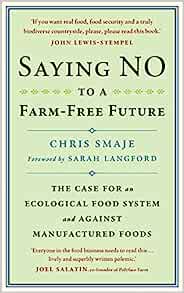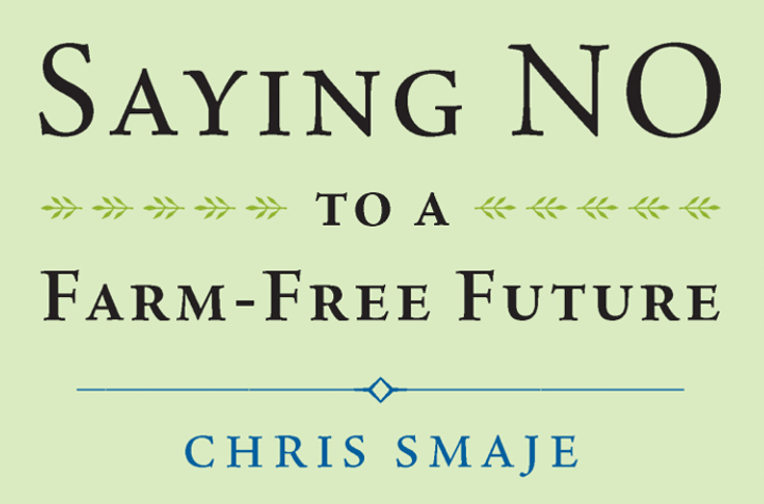 Ed. note: For the next few days, we are helping long-time regular contributor Chris Smaje highlight the UK release of his new book, Saying NO to a Farm-Free Future (available in the US on 20th July). Today we are posting a review by Crazy Town co-host Jason Bradford, who farms organically in the Pacific Northwest.
Ed. note: For the next few days, we are helping long-time regular contributor Chris Smaje highlight the UK release of his new book, Saying NO to a Farm-Free Future (available in the US on 20th July). Today we are posting a review by Crazy Town co-host Jason Bradford, who farms organically in the Pacific Northwest.
One of my pet peeves is ecomodernism. Ecomodernist authors have a knack for adeptly elucidating the polycrisis, and then offering nothing useful for dealing with it. Even if you are unfamiliar with the terms ecomodernism/ecomodernists, you are likely aware of their schtick, as it has come to dominate contemporary environmentalism. It is a groovy eco-philosophy that tells mostly urbanized, highly educated, white-collar folks that although the Earth is in danger, their lifestyles are not. Perfect for inserting a do-gooder vibe into political and business circles, and then fundraising.
For folks like me, with a background in ecology, decent awareness of the fragility of complex systems, and knowledge that the 50-year-old “Limits to Growth” model was never actually discredited, ecomodernists come across as delusional. They are classic double-downers, bumming you out with their description of reality, then telling you the same power structures, belief systems, industrial technologies, and ways of life that have led us over the cliff and into existential free fall will somehow catch us before we go splat. This trick is performed without any sense of irony or humility, and instead often reeks of condenscension towards those, such as author and farmer Chris Smaje, who suggest practical, albeit norm-challenging, ideas to keep the worst from happening.
Smaje is one of my favorite writers on farming and food system futures, with frequent blog posts published here on Resilience. His last book, A Small Farm Future, was a hit in my view, so I was eagerly anticipating his new release, Saying NO to a Farm Free Future. It didn’t disappoint.
The foil of the book is none other than the progressive and much-loved Guardian columnist George Monbiot, who recently authored his own treatise on the food system, Regenesis. Reluctantly, Smaje goes after Monbiot’s ideas while doing his best to avoid ad hominem attacks. Sadly, our favorite Guardian columnist has gone full ecomodernist, and while one can continue to believe in his good intentions and understanding of our predicament, he is promoting ill-advised, not-in-a-million-years-gonna-work, waste-of-our-finite-time-and-precious-resources schemes that are the opposite of what we ought to do.
Historically, Monbiot has not blinked from challenging the powerful, entrenched interests undermining long-term ecological stability, and he has often asked people to live by their values, even if doing so requires substantial sacrifice. Suddenly, he seems okay letting a centralized, industrialized, corporatized food system become even more so, applying manufactured food technologies that further dissociate people from the natural systems we all depend upon. In Monbiot’s utopia, 90% of us live in the city, and machines somehow take care of us while protecting nature.
Smaje explains, in modest technical detail, that the manufactured meal system at the heart of Monbiot’s techno-scheme is unlikely to succeed or even get off the ground. In a nutshell, we are talking about bioreactors, in which nutrients and an energy supply are fed to microbes (Monbiot’s favorite being the bacterium Cupriavidus necator), and they produce a mostly edible slurry. The proposed advantage with these technologies is that we no longer need farming to feed ourselves, thus freeing land for nature restoration.
If you aren’t technically proficient in one of several relevant disciplines, it may be difficult to rebut Monbiot. The premise is compelling and the promoters have marketing savvy and surface-level credibility. But wanting to believe something doesn’t make it true, and manufactured food appears to be part of a package of “green industrialism” arriving just in time to save high-energy modernity. For example, whereas ecosystems derive their energy supply from the sun via photosynthesis, the bioreactors are fed hydrogen and oxygen produced via electrolysis, which uses electricity. To supposedly make this eco-groovy, the electrolysis must be powered by “renewables.”
Step back and envision the full picture here. On the one hand we have farming, which has fed people for thousands of years using domesticated plants and animals that reproduce themselves via seeds, eggs, and uteri. On the other hand we have a proposal to mostly eliminate farms and replace them with massive arrays of solar panels, wind turbines, steel vats, pumps, and various other equipment that will continually break and need rebuilding. I am honestly dumbfounded that this unproven-at-scale, energy-hogging, and technically complex scheme is finding any traction. I encourage you to read Smaje’s book to get a full dismantling of manufactured food.
Saying NO to a Farm Free Future does more than just take down Monbiot and the broader ecomodernist philosophy. It presents, in a condensed form, much of what Smaje covers in A Small Farm Future.
Farming takes up a lot of space on Earth, and this is space that displaces other creatures. We have a biodiversity crisis, and we have agricultural soils that are losing carbon and leaching over-applied nutrients and toxins. Smaje is not a defender of this system, and so there are wide areas of agreement between him and Monbiot on the problems with agriculture. But whereas Monbiot says no farms, Smaje says small farms using agroecological techniques. Whereas Monbiot says spare land for nature, Smaje says share land with nature while we farm, and become more productive while getting more people onto small farms.
I find Smaje’s argument refreshing here. There has been a false “sparing vs sharing” dichotomy, especially in the UK, with the notion that we have a choice between less-productive farms that are nature-friendly, and more-productive farms that are nature-harming. But this argument has been applied almost exclusively to industrial farms, which are large, highly mechanized, and ecologically simplified relative to traditional and some modern systems that are more intensively managed by people. This intensity of management at a small scale often leads to yield productivity on a per area basis (area efficiency being the fetish of ecomodernists) that exceeds most industrialized systems. Of course area is just one of many input factors in farming, others being applied external nutrients, exosomatic energy, equipment, money, and human labor. If you see the future as being much like the recent past, where human labor is the most expensive factor of production, then you can only imagine farming with less human labor. However, as Smaje argues, more human labor is probably our future by necessity, and this changes what is possible, or even likely to evolve, with farming and food systems.
In Smaje’s view, sparing and sharing are not necessarily in conflict when people reconnect with the natural world, a notion Monbiot seems to scoff at. There appears to be an unbridgeable divide between worldviews: the ecomodernists who see humans as separate from nature, and the ecologically minded who see themselves as part of nature. Terms are being trialed such as “neo-agrarian” and “neo-peasanthood” that may be jarring to some who imagine humanity riding on some kind of techno-progress train. But for others, these terms acknowledge the liminal period we inhabit, as modernity and industrialization peak and wane. How do those raised in a culture of separation from nature, with abundant exosomatic energy from fossil fuels and vast transportation networks, develop the knowledge, skills, and new culture that draws from the past while preparing for a very different future? It would be nice if more of us were asking this question and seeking answers, and although it is a shame George Monbiot isn’t helping us out here, I am sure glad Chris Smaje is.





